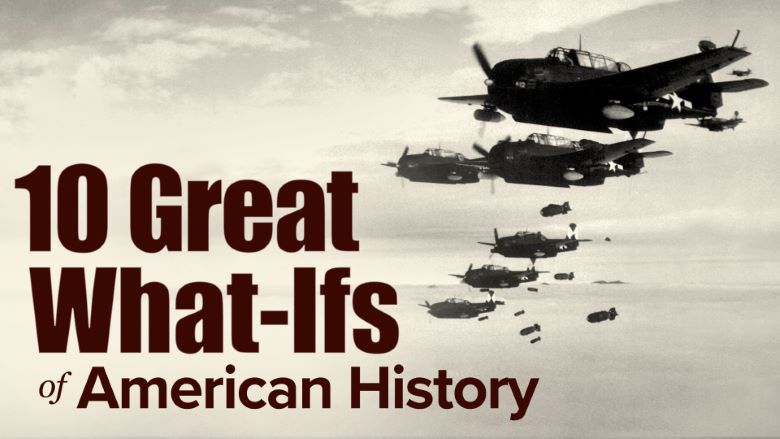
TTC Video - 10 Great What-Ifs of American History
.MP4, AVC, 1280x720, 30 fps | English, AAC, 2 Ch | 4h 14m | 3.53 GB
Lecturer: Adam Jortner, PhD Professor, Auburn University | Course No. 30620
History may appear logical and even inevitable: Things happened because they had to. But when you go back to examine the great turning points of the past, you quickly discover how choices, chances, and accidents played a huge rule in making the world we know today. Politicians, writers, explorers, and ordinary people all make choices that shape history. But examining the moments that define our history raises an important question: What if things had gone differently?
Historians have a term for this type of speculation. A "counterfactual" history imagines a different person, a different decision, different luck in a critical moment-and the way a small change could have transformed history as we know it. What if Christopher Columbus never got the money to sail in 1492? What if the Union lost the Battle of Gettysburg? Or President John F. Kennedy escaped assassination?
10 Great What-Ifs of American History offers you the chance to ponder some of the most captivating counterfactuals in the story of our nation. Over 10 eye-opening lectures, Professor Adam Jortner of Auburn University walks you through some of the most astonishing chance events in American history, from the signing of the Constitution to the moon landing. Joining him are six experts, hand-selected for their depth of knowledge in particular aspects of US history. Together, Professor Jortner and his colleagues take you through a mind-bending exploration of the history that could have been. Captivating storytellers and imaginative thinkers, these experts ask how much of history is shaped by split-second decisions, near misses, and sheer dumb luck.
By reflecting on what didn't happen, 10 Great What-Ifs of American History gives you new insights on what did happen-and the impact on our world today.
Imagine What Could Have Been
As you'll learn, a well-constructed counterfactual is about more than flipping a switch or taking a guess. Historians look for moments of "contingency"-times when something unlikely happened or when events turned on a moment that could have gone either way. What happens when you take away favorable weather conditions or delay an event by 15 minutes?
The most famous battle in the American Civil War provides your first excellent counterfactual. Most history enthusiasts understand the Battle of Gettysburg as a turning point in the war, but relatively few people have considered the role of Little Round Top, an unfortified area of high ground the Confederates hoped would allow them to bombard the Union troops.
The Confederates were on their way to this perch when, by chance, a Union army engineer arrived to check a signal station, saw the rebel troops, and alerted the Union forces. What if this engineer had arrived 15 minutes later? Could the Confederates have won the battle? And if so, would the morale boost have enabled them to negotiate an end to the war?
Although we cannot know for certain, Professor Jortner and his colleagues present a plausible scenario for Confederate victory that would have created a world unrecognizable to us today. The United States, emancipation, and even all of world history hinged on one person's looking a certain direction, from a certain vantage, at a certain moment.
Throughout these lectures, you'll dig into many such moments of contingency. What if a bullet had missed? What if a scientist had not died in surgery? What if a few electorates had changed their votes? While history may feel inevitable, it's jaw-dropping to see how our story is constantly hanging by a thread-and it reminds us how important our own choices and decisions are, even today.
Understanding Our World Today
Reflecting on what could have happened is more than a neat thought experiment. While it's fascinating to consider the threads on which history hangs, pulling on these threads helps us better understand the world as it is.
For example, the US Constitution was only ratified due to a few political tricks and a small handful of persuadable voters. In the wake of the Revolutionary War, the 13 colonies had just unseated a centralized power, so many were wary of establishing a new central government. The Constitution's passage may have depended on how one man scheduled the ratification convention in New Hampshire! Professor Jortner and his colleagues dig into the debates, compromises-and a few shenanigans-that would become the hallmark of the American experiment.
In an age of digital media and constant news, it can sometimes feel like individuals don't make a difference in the world. These counterfactuals explain that individual decisions and timely responses to problems can change the world-sometimes quite profoundly. Learning about how small things can lead to big outcomes can help us rethink our own debates and issues as we struggle with the modern world.
10 Great What-Ifs of American History shows that history doesn't exist in a vacuum. Working to gain a better sense of how historical figures imagined their worlds-and their futures-reveals that history is a poem, not a flow chart. Much of what seems inevitable now didn't seem that way at the time. The what-ifs of this course underscore how incredible history really is.
Free search engine download: 10 Great What-Ifs of American History






